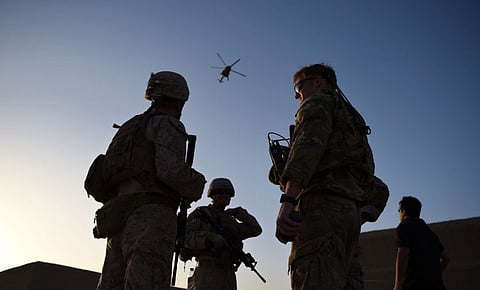Have the US-Taliban talks run into trouble?
Afghan talks must address a raft of issues, including demands from Kabul and other groups

Visiting Kabul recently Zalmay Khalilzad, the US peace envoy for Afghanistan, reported “no progress” in talks with Taliban during a meeting with the Afghan President Ashraf Gani. Khalilzad had earlier visited Islamabad to brief the Pakistani leadership.
Two days later US Secretary of State Mike Pompeo said in neighbouring Uzbekistan, “The Taliban were unable to demonstrate seriousness” in talks and demanded “demonstratable evidence of their [Taliban] will and capacity to reduce violence” before signing a deal that could lead to peace in Afghanistan.
The Taliban are believed to have given an undertaking to reduce violence and offered a 10-day ceasefire during which time the proposed deal with the US could be signed.
These comments from the American officials indicate that all is not well in the talks. The Americans seem to be shifting goalposts.
The American intervention has damaged the social fabric of the Afghan society. Afghanistan and its neighbours have paid enough of a price for this unending war imposed upon them. It’s time for them to live in peaceSajjad Ashraf
Doha talks
The Doha talks have focused on four main subjects: non-use of Afghan territory for terrorist attacks; American troops withdrawal; reduction of violence by the Taliban; and the intra-Afghan dialogue.
The last two questions have remained in focus during the current round of talks. Both sides accuse each other for ratcheting up violence and the Taliban refuse to talk to the Kabul regime, whom they call ‘puppets’ of the Americans. The Taliban know that the regime will not survive without the US military which Trump needs to show withdrawing in the election year.
Under the four major issues lie a multitude of problems that still need to be addressed, which include demands and expectations from the Kabul regime and other groups.
The US is negotiating directly with the Taliban and Kabul’s involvement is envisaged only after the ‘agreement in principle’ is signed between the two. There is a lurking fear that the US may jettison Kabul if it is seen to be thwarting US military withdrawal.
The question of what is the shape and size of phased US withdrawal is yet to be determined. Earlier news leaks indicated that the US wants an extended stay on four of its bases after an initial withdrawal of a few thousand men. The Taliban want the residue out sooner than the US wants.
Withdrawal of foreign forces
The question of immunity to US soldiers on duty in Afghanistan could also be thorny, especially if a sufficient residue of US troops remain. It would be difficult to imagine the Taliban agreeing to extend the immunity even in a power-sharing arrangement when their entire struggle has revolved around the withdrawal of foreign forces from Afghanistan.
Nothing is yet clear about what will happen to the Afghan National Security Force (ANSF), which continues to struggle on its own. Kabul wants to keep it intact as a buffer against the Taliban. If the force can hold on its own it could provide some stability in case trouble breaks out in the wake of US withdrawal. The Taliban, on the other hand, may want it disbanded, to remain with a smaller Taliban dominated force.
The key sticking point is whether Americans can persuade the Taliban to sit across the table and negotiate with the Kabul regime. If these talks take place the parties will have to work on how to implement a ceasefire between the Taliban and ANSF.
The two sides will also have to quickly tackle the question of heavily armed militias and Taliban fighters and how to integrate them into a unified national military force.
Electoral dispute
While the Western media continues to blame the Taliban for their refusal to talk to the ‘puppet’ regime in Kabul, an equally intractable problem is Gani’s and Abdullah’s (partners in the unity government in Kabul) intransigence over who is to represent the unity government in talks with the Taliban. The two are also locked in a bitter electoral dispute.
They both contested the presidential elections held on September 28, final results of which are yet to be declared. With voter turnout of less than 20 per cent the American hopes of producing a credible alternative to Taliban have been dashed.
With Gani leading in 16 provinces in the south and east, and Abdullah in 18 in the north and central highlands, polarisation could not be more stark. Any government formed out of such divided elections will necessarily be weak and at the mercy of warlords. The Taliban dismiss these elections anyway.
While not staking a claim on monopoly of power the Taliban have declared their intention to amend the constitution to bring it into conformity with their interpretation of Sharia and include others in the power structure on terms determined by them. This raises alarm especially among women and other liberal groups who are wary of a repeat of the previous Taliban regime.
Only time will provide answers to how these issues will be resolved. The American intervention has damaged the social fabric of the Afghan society. Afghanistan and its neighbours have paid enough of a price for this unending war imposed upon them. It’s time for them to live in peace.
— Sajjad Ashraf served as an adjunct professor at the Lee Kuan Yew School of Public Policy, National University of Singapore 2009-2017. He was a member of Pakistan’s Foreign Service 1973-2008 and served as Consul General of Pakistan to Dubai during the mid 1990s



